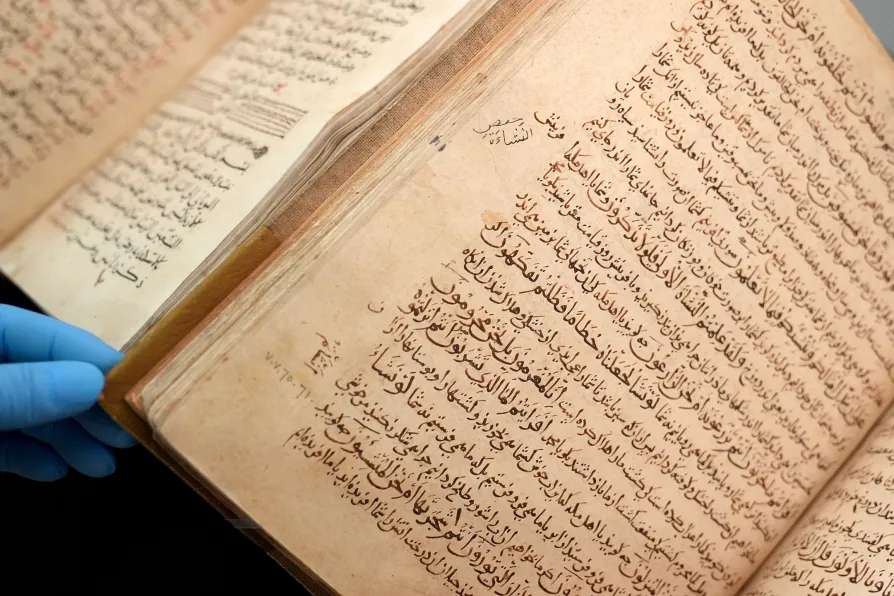DENNIS BROE searches the literary canon to explore why a duplicitous, lying, cheating, conning US businessman is accepted as Scammer-in-Chief
GORDON PARSONS is enthralled by an erudite and entertaining account of where the language we speak came from

 One of the oldest surviving prose texts in Persian, an Indo-European language, a 730-year-old commentary on parts of the Koran
One of the oldest surviving prose texts in Persian, an Indo-European language, a 730-year-old commentary on parts of the Koran
Proto: How One Ancient Language Went Global
Laura Spinney, William Collins, £22
AS we speak or read, we unconsciously exercise an activity and mind skill which establishes who we are, how we wish to live and how we understand our world. Language is perhaps the most essential and oldest tool that human beings are equipped with. If you are reading this, even if you are bilingual, like millions throughout the world you will almost certainly be able to negotiate your life using some form of English.
Laura Spinney’s book sets out to answer the questions, where and how did this language originate, evolve and become dominant?
As long as 60,000 years ago, “when humans walked out of Africa… they probably communicated mostly through speech.”
Spinney identifies our emerging language as Proto-Indo-European. “About 5,000 years ago, this exploded out of its Black Sea cradle, spreading east and west and fragmenting as it went. Within a thousand years its offspring could be heard from Ireland to India. The Big Bang of the Indo-European languages is easily the most important event of the last five millennia.”
As waves of migrations of peoples happened, for whatever reasons, their languages adapted to many pressures, including the demands on lifestyles (the change from hunter-gatherer to farmer), habitat, various trades, weather conditions, invasions etc. Now, roughly eight billion people speak around 7,000 languages divided into five “families,” much the largest two of which stand out being Indo-European (mostly English) and Sino-Chinese (including Mandarin).
History began with the advent of writing. Everything before is prehistory. In her detailed examination of the linguistic complexities, Spinney surveys the ever-expanding discoveries afforded by archaeology and genetic sciences. DNA dating of bones has opened up the past in ways previously impossible. Even “computational biologists track the microbes that have evolved alongside us… germs played their part in shaping the language we speak.”
There is, however, controversy among scholars over a range of theories, for “beyond about ten thousand years ago it becomes impossible to disentangle if languages resemble each other because they are related by common descent, or for some other reason — because they have borrowed from each other, say.”
Loanwords, for example, help to recapture not only the sound of ancient tongues but also links between languages.
Having outlined the purpose of her book, established the background and highlighted some of the complexities to this study of language, Spinney, chapter by chapter, takes the reader on an epic linguistic journey through the ages to the present. As languages weave through history and geography, exploring an expanding web of alliances, there is a wealth of incidental details to interest the common reader, revealing such fascinating observations as “alcohol was the lubricant that eased the passage” of the Indo-European languages, while the technical information will intrigue the curious student.
The advent of writing around 3,000 years ago, with ideograms scratched on clay tablets, marked the beginnings of retrievable records, allowing philologists to chart the evolution of language. However, “the well springs of European language and culture lie a long way behind it in prehistory.”
The final chapter engages with language in our current world, observing that “nationalists across the globe are projecting national identities back onto a world that didn’t know them” and “it’s hardly surprising that the linguistic impact of immigration depends on the relative size of the host and incoming populations, how long the immigrants stay and whether they come in peace or violence. But linguists know that many other factors play a role too, including immunity to infectious disease; religion; house prices; job openings; education; roads; and much, much more.”
Laura Spinney’s book is an informative, erudite and entertaining account of the many reconfigurations of Europe’s linguistic landscape over the last 5,000 years.

JOHN GREEN’s palate is tickled by useful information leavened by amusing and unusual anecdotes, incidental gossip and scare stories

New research into mutations in sperm helps us better understand why they occur, while debunking a few myths in the process, write ROX MIDDLETON, LIAM SHAW and MIRIAM GAUNTLETT











